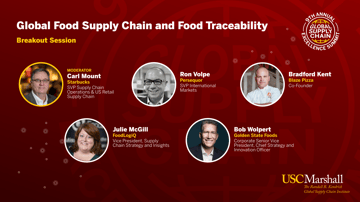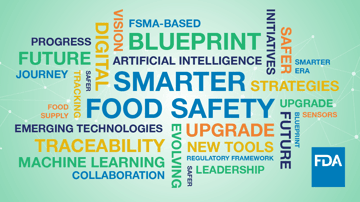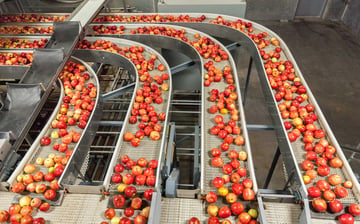FoodLogiQ’s VP of Supply Chain Strategy and Insights Julie McGill is joined by Kinetic12 Partner Bruce Reinstein for a discussion about how the consumer mindset, food transparency and technology are shifting due to the COVID-19 crisis. These changes are shaping a “New Normal'' for the food industry, which we are only beginning to understand. Listen to the discussion on the New Normal, and learn what to expect in the coming months.
Kinetic12 and IFMA first introduced their forward-looking research on the “New Normal” in a whitepaper titled, Looking Forward to Our New Normal. Since then, the organizations have produced a series of webinars and follow-up pieces exploring transformations in the food industry resulting from the COVID-19 global health crisis, including their most recent whitepaper, What’s Working and What Will Become Part of the New Normal.
The “Food-Safety First” Mentality
The New Normal, Reinstein says, is “fluid.” It is not only descriptive of the deep disruption felt across the world today, but also predictive of the way consumers and supply chain stakeholders will evolve to find a new baseline. “We’re still working towards it,” says Reinstein. Nevertheless, researching today what the New Normal may look like tomorrow is top of mind for many. Consumers have always been the driving force behind the food industry, and dramatic shifts in behavior and sentiment will have ripple effects felt long after stay-at-home orders are lifted or social distancing eases. “Some of the most basic parts of our lives can never be taken for granted again,” says Reinstein.
FoodLogiQ conducted a report on public sentiment surrounding food transparency prior to the COVID-19 crisis, and found that consumers reported that having insight into the sophisticated stories behind their food was not only valued, but, increasingly, an expectation. The New Normal will likely push this trend forward with a decidedly “Food-Safety-First” mentality.
“Where it used to be foodservice convenience, it’s really strictly safety now,” says Reinstein. “Consumers are going to have a much greater expectation of their environment, the people that they come in contact with, sanitation practices and the safety of their foods - and that’s going to be both at a restaurant and at their homes, so food transparency and visibility is going to become even more important to the consumer.” For the immediate future, “overall safety” will continue to play a more central role in the consumer mindset than anything else, notes Reinstein.
Technology, Trust, Transparency
For many, this crisis is the first time people are engaging in strict and routine hand-washing, sanitization of surfaces and incorporating health mindfulness into all of their interactions. People have also been forced to use new technologies to order meals or groceries. These pandemic conditions are elevating the consciousness of consumers and will have lasting impacts that food brands should prepare for. In addition to opting for “total transparency,” Reinstein says businesses will need to rely on simplicity across and board, using “frictionless technology” that allows customers to do the work of placing orders in a no-touch environment. Brands can build trust and increase loyalty by providing options that are highly navigable and consistent. “It is going to be a different game,” says Reinstein.
Transparency and ease are not only going to be requirements for the front-of-house; supply chain communications and partnerships will need to strengthen. Operators may opt for a leaner team and rely more heavily on strategic partners like manufacturers, distributors and growers, making visibility and reliable data key. “Anything that is what we’ll call ‘farm-to-fork,’ it is definitely going to have to be a partnership,” says Reinstein.
The new metrics of strong supply chain relationships will include proactively setting expectations, communication, and clear touchpoints that provide insight into where food is coming from. “There will be more partnering with growers and with farms,” in addition to more “local purchasing,” predicts Reinstein.
Investment in Risk Mitigation
Even when this crisis passes, weak points within the food supply chain cannot be unseen. Reinstein and his team predict a greater investment in risk mitigation and management in the future.
“This is not the norm, clearly; a pandemic is not something that will happen every day. But, I think it’s actually waking everybody up to the fact that we as a country, as organizations, were not prepared. So, if these restaurant brands are going to bring their revenue back and be able to succeed in the future, they’re going to have to work with their partners and develop a strategy to avoid risk in the future because we have to protect our supply chain.”
Kinetic12 and IFMA predict that the New Normal will include new C-Suite and VP risk management roles, more risk budgeting and a lower tolerance for running a leveraged business. They also expect to see an acceleration of investments in transparency and preparedness programs. “We need to prevent problems. We can’t wait for recalls to occur - we have to be very proactive. So instead of a few people being engaged and making decisions, and a lot of others listening in, it has to be that all the stakeholders are actively involved.”
Partnering to Protect the Supply Chain
Multi-stakeholder initiatives like the FDA’s New Era of Smarter Food Safety offer a good blueprint for partnering on safety and transparency, but it’s time for everyone to get on board.
“I think COVID-19 has exposed many things, and one of them was the inadequacy of our supply chain.” says Reinstein. “How can you waste all of the food that we’ve wasted, when there are so many people in need? It’s up to all of us to put the safety of our food supply at the top of the list. The New Normal has changed the mindset of the foodservice industry, and once we get back to business we’ll need to work together as one team on behalf of the consumer.”
At the end of the day, Reinstein believes, “it’s about doing the right thing.”
Preparing for the New Normal
If you would like to learn more about how to prepare for shifting consumer sentiments, supply chain visibility and risk mitigation, reach out to the FoodLogiQ team. We’re here to support the food industry in navigating the New Normal as we collectively work to protect consumers and the food supply chain.
Tag(s):
Other posts you might be interested in
View All Posts
Trustwell News
4 min read
| October 22, 2021
FoodLogiQ Talks Traceability at the Global Supply Chain Excellence Summit
Read More
Food Safety
5 min read
| December 18, 2019
A New Era of Smarter Food Safety Public Comments
Read More
Trustwell News
6 min read
| December 17, 2021

